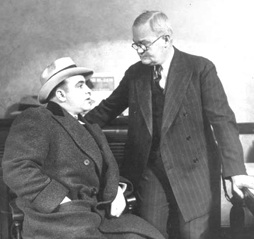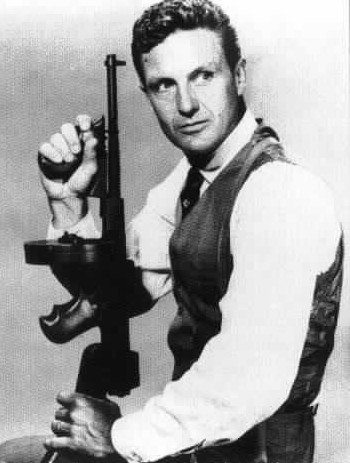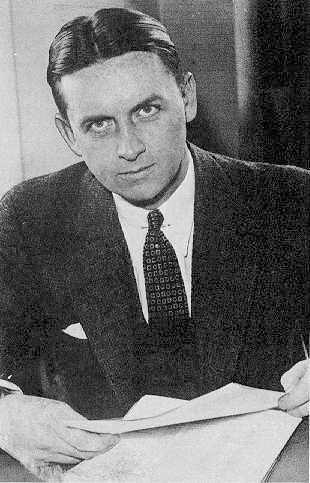| During
the annals of the Depression, as the city's deficit was nearly
$300,000,000, Capone was making out. The annual income of his
operations was estimated at $100,000,000 a year (Allsop,
199). There didn't seem to be any money in politics; indeed,
there seemed to be a vacuum sucking the money out of politics.
Mayor Cermak found the deficit so crippling that he said publicly
that the city might have to shut City Hall down entirely. Instead, Chicago cut down its expenses by slashing city employee wages and not
paying public school teachers, many of whom received only six
weeks' salary over nine months (Allsop,
197). Logically, during a period when money could not be
made legally/ legitimately due to the Depression, many sought
illicit means for supporting themselves. And so politicians
largely invented ways to turn a profit in their careers. Racketeering
became very common, and many politicians received profit for
ignoring the operations of organized crime leaders like Capone. |

Capone
and Stege, the Chicago Chief of Police (Citation).
|
|

Mayor Thompson
(Citation).
|
"Big
Bill" Thompson, two-term mayor of Chicago during the
period of prime expansion of Capone's empire, provides a perfect
example of political corruption operating at even the highest levels
of the city. Thompson himself had connections to the Capone
ring--one of his best friends was "Big Jim" Colosimo,
head Chicago gangster at the time Capone moved to the city.
Colosimo was Chicago's "prostitution czar" and, as we have noted in our Capone
Biography, Big Jim was promoted to a police precinct captain
by Thompson after swinging a number of voters to Thompson's
side (Allsop, 204). As Prohibition historian Kenneth Allsop writes,
"Without stretching the logical sequence too far, to
Thompson may be attributed Capone's eventual terrorization
of Chicago, for it was to protect the new prosperity conferred
upon him by the Thompson ring that Colosimo imported Torrio,
who in turn imported Capone" (Allsop,
204). Thompson later secured a friend in Congressman Fred Lundin,
as corrupt a politician as Thompson himself. The two even
tried to take over the city's judiciary, angered by the fact
that some judges refused payoffs. The plan failed, however,
when they were exposed by the press.
|
In a few instances, Thompson
even turned to violence as a means to impose his political will.
Democratic Alderman John Waters, who had controlled the 19th Ward since 1888, decided to run again in 1924.
Mayor Thompson, however, had a new agenda: the election of Anthony D'Andrea,
a notorious and well-known pimp, into the position. A bomb was thrown
into Powers' house, but Powers and his family were unharmed. Powers retaliated with a bomb of his own, thrown
by his men into a meeting of D'Andrea's supporters. Powers eventually
won the election, but the violence didn't stop there. D'Andrea's men
walked the streets with sawed-off shotguns, searching for Powers'
people. Death threats were sent to Powers' family. Eventually, Powers
struck the final blow--D'Andrea was killed later that year. Throughout
all of this, there was no police intervention in any of the incidents,
and federal investigation was deferred constantly (Allsop,
208). The cops, clearly, were just as crooked as the politicians, who were just as crooked as the mob. Indeed, during this period, the three seemed to form an interpenetrating web of crime.
This interrelationship
of organized crime and criminal politics continued to grow throughout
the 1920s as Prohibition continued, and as it continued to be more flagrantly
violated and exploited. After Thompson took a term off from 1922-24,
the Torrio-Capone machine was brought in to organize gun squads
to ensure Republican victory (Thompson's return to office in 1924).
(Allsop, 209). The police regularly
were paid off by Capone's men, and, in turn, they largely ignored
Capone's flagrant violations of Prohibition, prostitution, and gambling
laws, and even the severe acts of violence that they sustained.
|

Mayor Cermak (Citation).
|
Thompson's career
eventually did end, in 1930, and his successor, Mayor Cermak,
was told upon taking office that the 1928 and 1929 tax assessments
"reeked with fraud" (Allsop,
197). Clearly, Thompson had been embezzling tax
money, channeling it to God-knows-where. Mayor Cermak was
told at a special session of the State Legislature that the
only solution may be to place the city under martial law.
The plan was never carried out, and Capone's dominance of
the city continued throughout the Prohibition era.
|
| Nonetheless,
there were at least a few straight cops in Chicago. Eliot Ness,
who organized a group of law enforcers later mythologized as
the "Untouchables," was one of them. As in the film
The Untouchables, and the television show the film was based
on, Capone's lieutenants sent death threats to Ness, and hired
an assassin to wipe him out (the assassin failed). Earlier,
they tried to pay him off. After Ness refused their bribes,
a newspaper article called him "Untouchable." The
myth of the "Untouchables" was built around this fact.
Ness and the Untouchables conducted frequent raids on Capone's
breweries, often causing violent confrontations. Ness, however,
was the exception in his not being pocketed by Capone (Tucker,
12). Eventually, Ness's group collected sufficient evidence
against the Capone ring to send him to prison (see our pages
on Al Capone for further information).
After the victory against Capone in Chicago, Ness was moved
to Cincinnati, Ohio, where he continued to conduct raids on
breweries until the end of Prohibition. In one of history's
supreme ironic jokes, Ness, ever the poster child for Prohibition
enforcement, struggled throughout his life against a drinking
habit (Tucker, 5). |

The
Untouchables DVD cover (Citation).
|
|

Robert
Stack as Elliot Ness from The Untouchables television
show (ABC) (Kassel).
|

A
picture of the real Elliot Ness (Corrigon).
|

|







